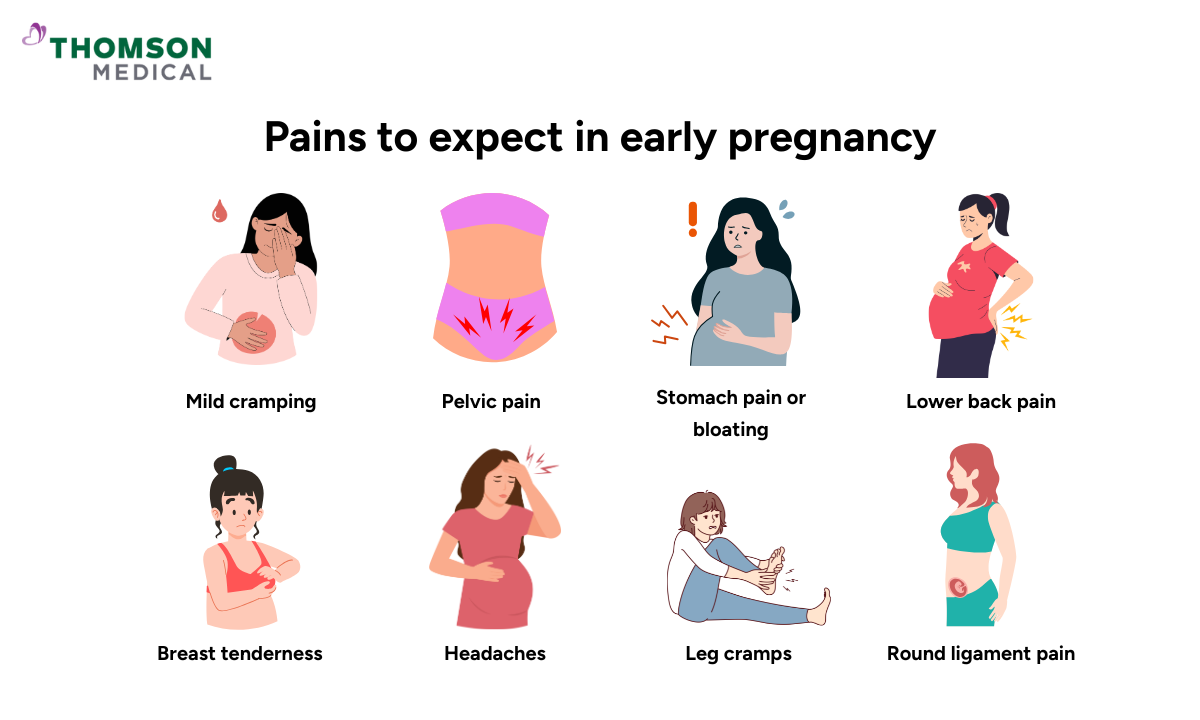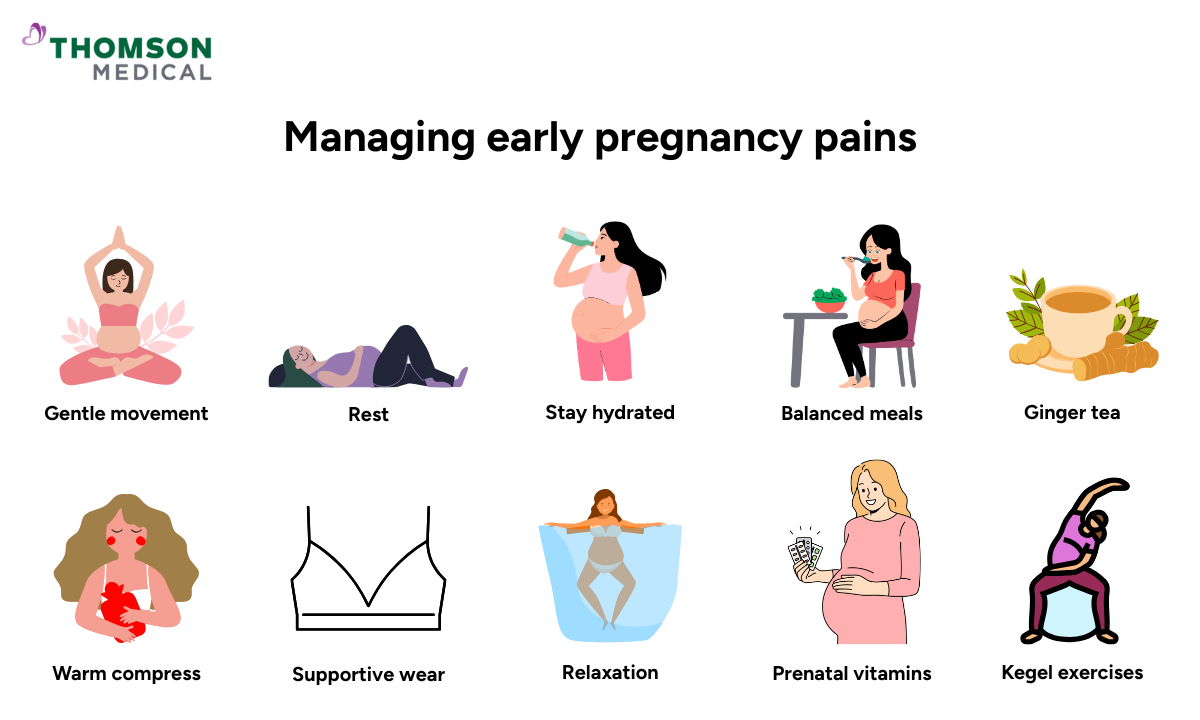During the first weeks of pregnancy, you might be surprised by how quickly your body is changing. The hormonal shifts and physical adjustments can bring a range of sensations, from gentle cramps and occasional twinges to more pronounced aches.
While many of these discomforts are a normal part of the journey, understanding what's happening and knowing what's considered typical can make you feel more reassured.
What kind of pains to expect in early pregnancy?

Every pregnancy is different, and so is the way your body responds. Many people experience mild cramps or pulling sensations in the lower abdomen, similar to menstrual cramps. Others might feel brief, sharp twinges or a dull ache as the uterus (womb) begins to expand. Here are some of the pains you may experience:
Mild cramping and pelvic pain:
Similar to period cramps, these are often linked to implantation or the stretching of the uterus as it begins to grow.
Occasionally, pain in the pelvic region may also be associated with the fallopian tubes, especially if there are concerns such as an ectopic pregnancy.
Stomach pain or bloating:
Hormonal changes can slow digestion, leading to constipation or general abdominal discomfort.
Lower back pain:
As ligaments loosen and posture shifts, backaches may become more noticeable.
Breast tenderness:
Breasts may feel sore, swollen, or sensitive due to hormonal changes and increased blood flow.
Headaches:
Usually common in the first trimester of pregnancy. Fluctuating hormones, fatigue, or changes in blood pressure can trigger mild headaches.
Round ligament pain:
A pulling or sharp sensation on either side of the abdomen as the womb expands.
Leg cramps:
Sometimes called “Charley horses”, these sudden cramps in the calves or feet may occur, especially at night.
These symptoms are often harmless and reflect your body’s natural adjustments in the first trimester. However, if any pain feels severe, persistent, or is accompanied by other concerning symptoms, it's always a good idea to consult a doctor for reassurance.
If you feel unsure about the pain you are experiencing, you can request an appointment with Thomson Women’s Clinic for further guidance.
Our O&G specialists
Loading...
What causes early pregnancy pains?
Early pregnancy pains can arise from a variety of changes in your body, including:
Implantation process:
When a fertilised egg attaches to the uterine lining, light cramping or spotting (known as implantation bleeding) may occur. This often happens around the time of a missed period.
Hormonal changes:
Rising levels of progesterone and hCG can affect muscles and ligaments, sometimes leading to lower abdominal cramps or round ligament pain.
Uterine growth:
As the uterus expands, stretching can cause mild aches on either side of the lower abdomen.
Digestive changes:
Pregnancy hormones can slow digestion, resulting in constipation, trapped wind, or bloating.
Increased blood flow:
Greater blood volume and circulation in the pelvic area may contribute to a feeling of heaviness or mild pelvic discomfort.
Managing early pregnancy pains

There are many safe and simple ways to ease common discomforts in early pregnancy, such as:
Gentle movement:
Stretching, walking, or prenatal yoga can reduce cramps and back pain.
Rest:
Lying on your side with a pillow between your legs can relieve strain on the lower back and pelvis.
Staying hydrated:
Drinking enough water can prevent cramps and improve digestion.
Eating balanced meals:
Small, frequent meals may ease bloating, nausea, constipation, and other digestive discomforts.
Ginger tea:
A natural option that may help reduce nausea and calm the stomach, especially during episodes of morning sickness.
Warm compress:
A warm compress on the lower abdomen or back can help to soothe aches.
Supportive wear:
A well-fitted supportive bra and maternity support garments can provide relief from breast tenderness and back pain.
Relaxation:
Mindful breathing, warm baths, or relaxation techniques can ease tension.
Prenatal vitamins:
These support your body’s needs during pregnancy and may help reduce certain discomforts.
Kegel exercises:
Strengthening the pelvic floor muscles can improve circulation, reduce pelvic discomfort, and support bladder control during pregnancy.
When should you seek help?
Most early pregnancy pains are mild and harmless, but there are times when you should seek medical advice. However, it is advised that you should contact your healthcare provider if you experience:
Severe or one-sided abdominal pain that does not improve, which could indicate an ectopic pregnancy or ovarian issue
Vaginal bleeding that is heavy, bright red, or accompanied by clots
Fever, chills, or unusual vaginal discharge, which may suggest an infection such as urinary tract infections
Pain with dizziness or fainting, which may indicate a more serious concern
Any symptom that feels severe, persistent, or unusual for you
First-trimester care at Thomson Medical
If you're experiencing early pregnancy pains or want professional advice about your symptoms, Thomson Medical is here to help. We provide first-trimester care tailored to your individual needs from the moment you think you might be pregnant until your 12th week of pregnancy.
Our early pregnancy care includes:
Early pregnancy assessment:
Detailed ultrasound scans to confirm pregnancy and check foetal development
Blood tests to measure hCG levels and assess early pregnancy health
Dating scans to establish your due date
First-trimester pre-eclampsia screening:
An early assessment to estimate the risk of developing pre-eclampsia later in pregnancy
OSCAR (One-Stop Clinic for Assessment of Risk of Foetal Anomalies):
Combines ultrasound and maternal blood tests to evaluate the likelihood of certain chromosomal conditions
NT scan with NIPT:
A nuchal translucency (NT) ultrasound combined with a non-invasive prenatal test (NIPT) that screens for chromosomal differences with high accuracy
Chorionic Villus Sampling (CVS):
An early diagnostic test that can detect specific chromosomal or genetic conditions when further information is required
For more information about early pregnancy pains and to discuss your individual circumstances, request an appointment with Thomson Women's Clinic.
FAQ
Which pains are normal in early pregnancy?
Mild cramping, lower back pain, breast tenderness, and even occasional headaches are common in early pregnancy. These are usually harmless and linked to hormonal changes or the uterus beginning to expand.
When does pregnancy pain usually start?
Some women feel cramps as early as 1 to 2 weeks after conception, often linked to implantation. Other pregnancy symptoms, such as nausea, fatigue, or breast changes, may follow in the first trimester.
Why do I feel uncomfortable at 20 weeks pregnant?
By 20 weeks, which is the second trimester, the uterus grows more rapidly. Round ligament pain, backaches, indigestion, and leg cramps are common. However, sudden or severe symptoms, especially if accompanied by vaginal bleeding, should always be checked by a healthcare provider.
Which side is pain more common on during early pregnancy?
Round ligament pain may cause sharp or dull aches on either side of the lower abdomen. However, persistent or severe pain on one side, especially in early pregnancy, should be checked to rule out an ectopic pregnancy in the fallopian tube.
Is stomach and back pain normal in early pregnancy?
Yes. Mild abdominal or stomach pain and lower back pain are typical early pregnancy symptoms. If the pain becomes strong, persistent, or is accompanied by other symptoms such as vaginal bleeding, you should seek medical advice.
Where are early pregnancy cramps usually felt?
Early pregnancy cramps are most often felt in the lower abdomen or pelvis, similar to menstrual cramps. They are usually caused by implantation or the uterus stretching as it grows.
The information provided is intended for general guidance only and should not be considered medical advice. For personalised recommendations and tailored advice, request an appointment with Thomson Women's Clinic today.
For more information, contact us:
Thomson Specialists (Women's Health)
Thomson Women's Clinic (TWC)
- Novena:
6592 6686 (Call), 8611 8986 (WA) - Bukit Batok:
6569 0668 (Call), 8686 3525 (WA) - Choa Chu Kang:
6893 1227 (Call), 8282 1796 (WA) Jurong:
6262 8588 (Call), 6262 8588 (WA)- Katong (female doctor):
6970 2272 (Call), 8611 9020 (WA) - Punggol:
6243 6843 (Call), 8811 0328 (WA) - Sembawang: 6753 5228
- Sengkang: 6388 8125
- Serangoon (female doctor): 6382 3313
- Tampines: 6857 6266
- Tiong Bahru: 6276 1525
